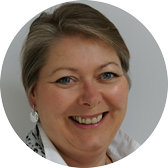Having spent most of her career in the marketing and business data industry Dawn Holmes, who is nearing completion of her Doctor of Business Administration (DBA) at AMBS, now splits her time between studying, teaching and consulting.
She says this mix proves invaluable as each element naturally feeds off each other. “I love the mix of challenges I face in my working day. Typically, in the morning I could be a student myself, in the afternoon I could be teaching on a programme where I have become a specialist, and in the evening I could be doing consultancy work for a client.

“The wider point is that my own studies are keeping me up to date with recent trends and ideas, my consulting work is keeping me in touch with business issues and the real world, and my students are keeping everything in perspective and very real for me. At the end of the day, if you cannot explain something to an 18-year-old that gets them energised about learning, then you don’t understand it yourself.”
Career
Dawn has long-established links with AMBS having graduated with a MBA in 1992. At the time she had just begun her career in marketing and was keen to supplement her knowledge with a more formal business education. A few years later she joined Manchester-based electronics company Brother where she worked for many years on a number of marketing campaigns, and also worked in the emerging field of business information systems and data-driven decision making.
After leaving Brother she set up her own marketing consultancy and, in order to open up more opportunities with larger clients, she embarked on a DBA investigating the use of data to improve B2B customer experiences.
As she explains: “The key questions I wanted to ask revolved around what, how and why. What are companies doing, how are they doing it, and why are they doing it. As part of this I’ve been exploring what is getting in the way and what are the main challenges, and how academic theories and knowledge might help with overcoming them. The end goal is to build a framework, or conceptual model, that will be useful to practitioners. It is not quite a ‘how to’ guide, more a ‘here are some things to think about’ guide.”
Sector context
As part of her research Dawn has been comparing three very different types of companies in very different sectors - IT, engineering and marketing - to see how much of an impact the sector context has.
“One of the biggest challenges for me has been in defining the research, especially in relation to specific terms around data and customer experience. Both areas have a multitude of definitions, so honing that down to something that is relevant and meaningful to management practitioners has been tricky but interesting.
“In these complex areas managers often think they are behind the curve when actually they are not. But there are few tools to help them understand solutions. Typically they are either too IT-focused or too management focused.”
Teaching
Almost as soon as she started her DBA, Dawn – who is also a non-executive director at the Chartered Institute of Marketing - realised her wider knowledge of industry could prove invaluable on a number of AMBS teaching programmes, and she was invited to start lecturing. “I quickly realised that I loved teaching the subject too, and seeing students get really excited about the marketing industry I am passionate about touched a real chord with me.”
Today she is an Associate Lecturer on a wide range of marketing programmes at both undergraduate and MSc level, as well as on the MBA, Global MBA, and various Executive Education programmes.
After completing her DBA she is hoping to take up a full-time teaching and scholarship role at AMBS.
“Moving into teaching was not in my career plan five years ago, but I enjoy it so much that I can’t imagine not doing it. And I’m really looking forward to seeing how teaching develops when we get back to face-to-face delivery. I think we’ve all developed so many resources and different teaching skills that lecturing will never be the same again, and that excites me.”

